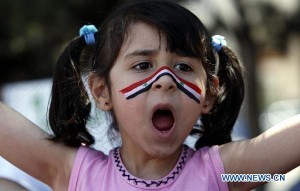Children of Syria: the forgotten victims

.
“Damn your soul Bashar,” chanted Mustapha, 12, while dozens of students from his school in the province of Daraa repeated the phrase and his mother looked on encouragingly.
Mustapha owns a picture of Hamza al-Khatib, a child who was arrested and killed by security forces; the boy remembers dozens of other students who were tortured in the cellars of the political security division in Daraa, which first sparked the Syrian revolution.
Mustapha shows his pain as he recounts the stories of young men who have been to these prisons, and expresses his fear of the danger surrounding his family.
“My father and my cousins are in real danger because of Assad’s gangs,” Mustapha said.
In protest hotspots, families no longer try to stop their children from going out on demonstrations.
“We’ve been through enough; let our children have the freedom they want,” said Mustapha’s mother.
In Mustapha’s city, security forces as well as the mercenaries that support them have arrested hundreds of men and led them to unknown destinations, only to be returned with the “colours of freedom” marking their skins, as the people of Daraa euphemistically describe the scars resulting from torture.
Mentioning the expression “security forces” to children has become equivalent to invoking the bogeyman.
“The security [forces] are on the street,” says five-year old Omar to his mother whenever he wants to scare her, along with asking her whether “security [forces] are going to shoot at us” every time he’s out on the street.
Ola, eight, from the village of Saqba, narrates what happened with the chemist down the street from where she lives, when he security members broke in and vandalised his pharmacy.
“They walked into the street shouting out, ‘God, Syria and Bashar,’” said Ola. “They were many and had green cars; they broke every car parked in the street, and broke [into] shops in order to rob them. I swear to God, I saw them beating up the pharmacist and stealing his money, and after that they arrested him and smashed up the pharmacy.”
Ola saw all this from behind a closed window with a reflective surface; no-one standing outside could not have seen her during that incident. But Ola was still terrified.
“I was scared that they will hear me, so I put my head down and looked out of the corner of my eye,” she added, while re-enacting what the security forces were doing that day.
Social researcher Bassima Orabi described several cases of Syrian children suffering from psychological disorders.
“The anxiety [children are experiencing] can lead to obsessive compulsive disorder, and possibly trauma and dissociative disorder, as well as attempts of self-mutilation or even elimination and attachment disorders in their early years,” Orabi said. In addition to these potential risks, a large number of children who have been subjected to physical harm have a tendency to exhibit violent behaviour as well as poor academic performance, she added.
A professor of psychology at the university of Damascus, who spoke on condition of anonymity, made a direct link between the practices of security forces in various areas of Syria and the risk of delinquency among Syrian children.
“Childhood is the most important phase in humans. If a child is subjected to a painful experience, it will lead to an imbalance which will prepare the child for delinquency at any point of his life,” he said, adding that security forces pursuit of punishment could backfire as eventually Syrian citizens could become accustomed to it.
“Some might respond to this approach by the security forces, but the majority, and especially children who see their fathers being killed, tortured or beaten up will have these events engraved in their memory, so they will grow up full of hatred,” he added.
Violations against Syrian children have even drawn criticism by some of the highest ranking United Nations officials.
Last December, the UN human rights high commissioner, Navi Pillay said that 307 children had been killed since the outbreak of the protests in Syria last March, adding that there was evidence that children were among the victims of torture, in addition to being sexually assaulted at detention centres. UNICEF’s executive director, Anthony Lakes, strongly condemned security force practices against children, urging the Syrian government to honour its commitments to protect children’s rights.
The Syrian government, for its part, has failed to make any comment about children’s rights violations.
